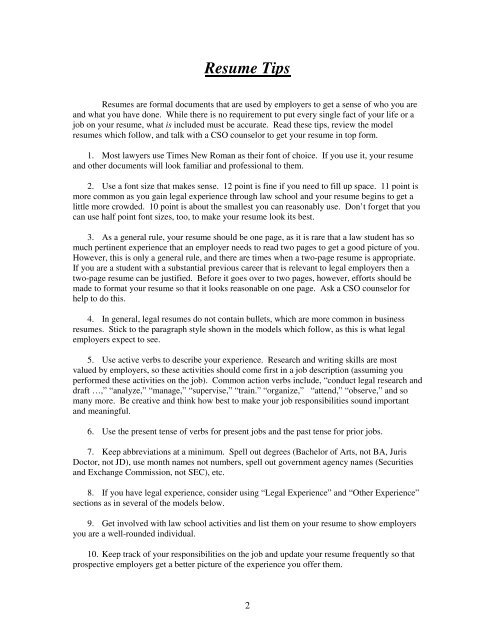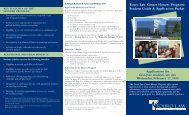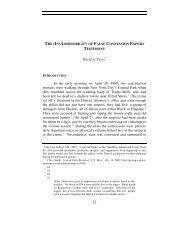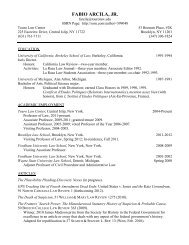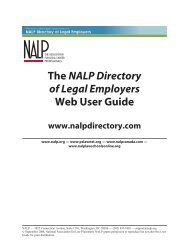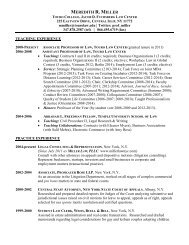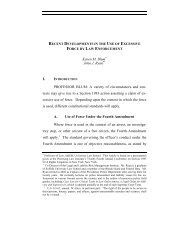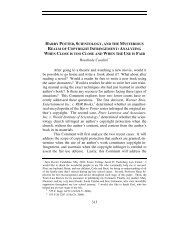Resume, Cover Letter, Writing Sample and ... - Touro Law Center
Resume, Cover Letter, Writing Sample and ... - Touro Law Center
Resume, Cover Letter, Writing Sample and ... - Touro Law Center
Create successful ePaper yourself
Turn your PDF publications into a flip-book with our unique Google optimized e-Paper software.
<strong>Resume</strong> Tips<br />
<strong>Resume</strong>s are formal documents that are used by employers to get a sense of who you are<br />
<strong>and</strong> what you have done. While there is no requirement to put every single fact of your life or a<br />
job on your resume, what is included must be accurate. Read these tips, review the model<br />
resumes which follow, <strong>and</strong> talk with a CSO counselor to get your resume in top form.<br />
1. Most lawyers use Times New Roman as their font of choice. If you use it, your resume<br />
<strong>and</strong> other documents will look familiar <strong>and</strong> professional to them.<br />
2. Use a font size that makes sense. 12 point is fine if you need to fill up space. 11 point is<br />
more common as you gain legal experience through law school <strong>and</strong> your resume begins to get a<br />
little more crowded. 10 point is about the smallest you can reasonably use. Don’t forget that you<br />
can use half point font sizes, too, to make your resume look its best.<br />
3. As a general rule, your resume should be one page, as it is rare that a law student has so<br />
much pertinent experience that an employer needs to read two pages to get a good picture of you.<br />
However, this is only a general rule, <strong>and</strong> there are times when a two-page resume is appropriate.<br />
If you are a student with a substantial previous career that is relevant to legal employers then a<br />
two-page resume can be justified. Before it goes over to two pages, however, efforts should be<br />
made to format your resume so that it looks reasonable on one page. Ask a CSO counselor for<br />
help to do this.<br />
4. In general, legal resumes do not contain bullets, which are more common in business<br />
resumes. Stick to the paragraph style shown in the models which follow, as this is what legal<br />
employers expect to see.<br />
5. Use active verbs to describe your experience. Research <strong>and</strong> writing skills are most<br />
valued by employers, so these activities should come first in a job description (assuming you<br />
performed these activities on the job). Common action verbs include, “conduct legal research <strong>and</strong><br />
draft …,” “analyze,” “manage,” “supervise,” “train.” “organize,” “attend,” “observe,” <strong>and</strong> so<br />
many more. Be creative <strong>and</strong> think how best to make your job responsibilities sound important<br />
<strong>and</strong> meaningful.<br />
6. Use the present tense of verbs for present jobs <strong>and</strong> the past tense for prior jobs.<br />
7. Keep abbreviations at a minimum. Spell out degrees (Bachelor of Arts, not BA, Juris<br />
Doctor, not JD), use month names not numbers, spell out government agency names (Securities<br />
<strong>and</strong> Exchange Commission, not SEC), etc.<br />
8. If you have legal experience, consider using “Legal Experience” <strong>and</strong> “Other Experience”<br />
sections as in several of the models below.<br />
9. Get involved with law school activities <strong>and</strong> list them on your resume to show employers<br />
you are a well-rounded individual.<br />
10. Keep track of your responsibilities on the job <strong>and</strong> update your resume frequently so that<br />
prospective employers get a better picture of the experience you offer them.<br />
2


